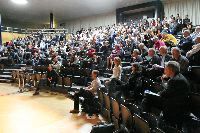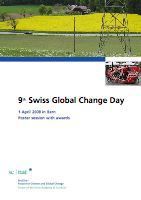9th Swiss Global Change Day - Meeting Report
(ev) On 1 April 2008 the Swiss global change research community met on the ninth Swiss Global Change Day in Bern. Again almost 300 participants took the opportunity to network and to discuss with people from related fields. More than 80 posters were presented showing the range of research activities in Switzerland.

Six key note speakers presented new findings, highlights and challenges in the broad field of global environmental change research:
Gavin Schmidt from the Goddard Institute of Space Science in the US clarified the background of climate model results. He is convinced that many users of climate projections have little knowledge of what goes into climate models, what is not included, what is robust and what is uncertain. Schmidt believes that a better background helps to better present climate model results to the public. (--> Presentation, 1 MB)
Fortunat Joos from the University of Bern focused on the speed of change in greenhouse gas concentrations. He stated that the current speed is unprecedented at least during the last 22'000 years. Joos explored the effects of increasing greenhouse gas concentrations on ocean acidification and concluded that CO2-emissions must be reduced by more than 50% in the next decades in order to avoid dangerous anthropogenic climate interference. (--> Presentation, 1.1 MB)
Antoine Guisan from the University of Lausanne looked at the impact of global change on mountain flora. By means of a modeling approach he made predictions about the species distribution and diversity of the alpine flora in the Swiss Alps due to climate change. (--> Presentation, 5.3 MB)
Julie Brigham-Grette from the University of Massachussetts is convinced that we can better understand current and expected future changes in the Arctic by looking at the past. She expects rapid changes in the Arctic and shows that the large ice sheets are vulnerable and capable of providing significant contributions to global sea level. (--> Presentation, 3.2 MB)
Mike Hanemann from the University of California reviewed the economy of climate change. He showed the factors that influence the policy conclusions of economists. In particular, Hanemann compared the Stern Review with Nordhaus's review of Stern and showed why they come to different conclusions with regard to both the timing and form of climate change policy. (--> Presentation, 0.5 MB)
Dieter Imboden from the ETH Zurich compared the aim of the 2000 Watt society with J.F. Kennedy's vision of 1961 to send a man to the moon. He stated that no effort has been made so far to achieve the goal. Imboden reassessed the need for the 2000 Watt society and analysed the different kinds of knowledge that must be involved for the moon flight of our century. (--> Presentation, 0.6 MB)
In the poster session the best posters in each of the fields WCRP, IGBP, IHDP and DIVERSITAS were selected by a jury and honored with a travel award of SFr. 1000.- each. The following posters were awarded:
WCRP (awards were sponsored by the ACP, the Commission for Atmospheric Chemistry and Physics, SCNAT):
- Emanuel Brocard: Deriving winds at cloud-base height using infrared camera and microwave radiometer
- Nadja Riedwyl: Skill assessment of two reconstruction methods fro three climate variables
- Ozan Mert Göktürk: Stalagmites from Northern Turkey: Potential Climate Proxies for the last Tree Millennia
- Ottmar Joos: Reduced contribution of fresh litter to CO2-efflux during drought
- David Raemy: Nachhaltige Landschaftsentwicklung - Möglichkeiten der institutionellen Steuerung am Beispiel der Reblandschaft Bielersee
- Samuel Schmid: Plant functional diversity decreases with abiotic stress in alpine ecosystems
The Commission for Atmospheric Chemistry and Physics (ACP) awarded two outstanding contributions to the atmospheric sciences. The awards were given to:
- Sönke Szidat, University of Bern
- M. Rami Alfarra, PSI
Downloads/Links
- Gavin Schmidt - Climate Model Results: Perceptions and Confusions
- Fortunat Joos - Ocean Acidification: Are we Approaching Dangerous Greenhouse Gas Concentrations?
- Antoine Guisan - Global Change and Mountain Floras: Predicting Future Species Distribution
- Julie Brigham-Grette - Climate Change in the Arctic – Future Lessons from the Past
- Mike Hanemann - The Economy of Climate Change Revisited: Why the Hurry?
- Dieter Imboden - Energy and Climate - the 21th Century Flight to the Moon Reconsidered


